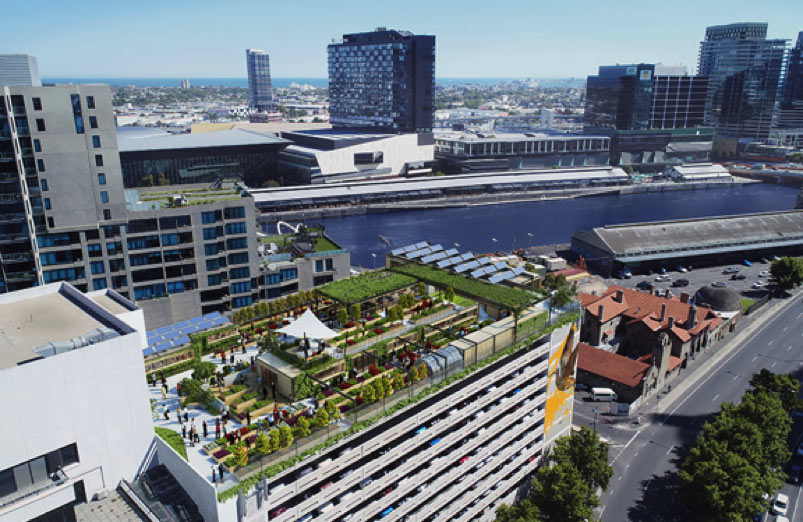Back in 2007 DS.Emotion explored ways to make good use of empty or stalled development sites, suffering from a lack of, or at times no, funding. Our solution back then was to create transportable urban allotments which would be sponsored by private companies and tended by local schools and charities, the produce from which could be used to feed a growing homeless population and the immediate local community. Twelve years later and the need to create green urban spaces is still there, fuelled by what is is now an even more pressing environmental situation.
On reading an article on theurbandeveloper.com, which talks about Melbourne’s first ‘Skyfarm’ – a 2,000 sq m urban farm growing crops on the roof of a former carpark which aims to increase biodiversity in the city and raise awareness and support for urban farming, I realised the issue has only intensified. These sorts of initiatives are now driven by the need to cool our cities and counter the heat absorbed and retained by our buildings. Rooftop green spaces are ideal for exactly this as well as feeding our growing urban populations – 300kg of produce was created from an area the size of 2 car parking spaces in just 6 months from scratch on this Melbourne rooftop.

Greening our cities should be high on any developer or council’s agenda from a sustainability perspective. DS.Emotion’s work for the UK Green Building Council (UKGBC) is helping to highlight that the built environment accounts for around 40% of the UK’s total carbon footprint. With health and wellbeing now a key strategic objective we think it’s imperrative that UK developers do all they can to help address and counter this issue.
A winner in the 2018 Sustainable City Awards, Repowering London Energy Gardens is just this type of development, providing green spaces which improve the local environment. A clever use of solar panels as assets of the development allows businesses a chance to support local communities by becoming shareholders in the solar energy created helping them to come together to grow food, generate and use clean energy as well as encouraging internships and training.
Creating long term sustainable communities such as this is not simply a matter of ‘if you build it they will come’. It is important to provide the tools for people to be able to take ownership of such spaces – understanding that such facilities belong to them, helps to ensure that the facilities themselves are taken good care of. One way to provide this connectivity is via neighbourhood apps which provide an efficient messaging system for residents and occupiers helping them to feel part of and contribute to their built environment. DS.Emotion are currently creating a range of neighbourhood apps which deliver on these objectives.
Successful places should be created with a long term vision, an effective planning and construction agenda and the ability to respond to rapidly changing environmental situations. The brands we create for commercial and residential places work into the fabric of a city and ultimately our own needs as consumers.
By applying our brading, placemaking and marketing strategies we can help you to successfully build communities with an end goal in mind – to radically improve the long term sustainability of the built environment.
DS.Emotion continue to work with UKGBC in promoting and developing new insights and collaborations, and supporting the creation of sustainable innovations.
For further information on place activation strategies please contact us.